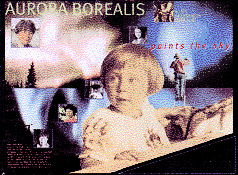|
|
 
Margaret Galland Kivelson |
|
|
 
Margaret Galland Kivelson |
 Professor of Space Physics at U.C.L.A. and Principal Investigator for the Magnetometer Investigation on the Galileo Orbiter, Margaret Galland Kivelson is passionate about her career. As she put it in a recent Graduation Address at U.C.L.A., "what goal could be more inspiring than to understand the origin and evolution of the solar system and the universe?" Yet when she embarked on this career path as an undergraduate in the late forties, her expectations for herself reflected the low expectations society had for her as a woman interested in science.
Professor of Space Physics at U.C.L.A. and Principal Investigator for the Magnetometer Investigation on the Galileo Orbiter, Margaret Galland Kivelson is passionate about her career. As she put it in a recent Graduation Address at U.C.L.A., "what goal could be more inspiring than to understand the origin and evolution of the solar system and the universe?" Yet when she embarked on this career path as an undergraduate in the late forties, her expectations for herself reflected the low expectations society had for her as a woman interested in science.
When Margaret Kivelson was in high school, one uncle suggested that she become a dietitian; he "probably thought the Department of Home Economics was a good spot for me," Kivelson remembers. As an undergraduate at Radcliffe and later as a graduate student at Harvard University (where she obtained her Ph.D. in Physics in 1957), Kivelson had few female mentors, since women were "virtually absent" from the sciences at the time. Having overcome significant professional obstacles herself, Kivelson has been dedicated to improving the status of women in academia throughout her career, especially by encouraging their involvement in the physical sciences. She served on the first Chancellor's Advisory Committee on the Status of Women, later becoming its Chair, was President of the Association of Academic Women at UCLA, and helped initiate the Women's Studies Program on campus. Most of Kivelson's work has been devoted to studying planetary magnetospheres, the regions around many of the planets of the solar system in which the planetary magnetic fields trap charged particles, ions and electrons. Magnetospheres are responsible for such spectacles as the aurora borealis in the nighttime polar sky, and for less desirable phenomena such as blown power transformers and sound disturbances that overwhelm communication channels on earth. These disturbances may be linked to changes in the Sun's magnetic field. Within this field of study, Kivelson has concentrated on Jupiter and the electromagnetic currents that flow between this planet and its moons Io, Europa, Ganymede, and Callisto. In 1977, Kivelson was named Principal Investigator for the Magnetometer Investigation on the Galileo Orbiter, a spacecraft inserted into orbit in 1995, designed to spend several years making measurements in orbit around Jupiter. She served as an Overseer of Harvard College from 1977-1983, chaired the department of Earth and Space Sciences at UCLA from 1984-1987, and has held visiting appointments in France and inChina. Meanwhile, Kivelson has authored some 200 papers on space plasmas and planetary properties, and edited several books on space science. She has two children, Valerie Kivelson, Professor of History at the University of Michigan, and Steven Kivelson, Professor of Physics at UCLA, and five grandchildren. Sources: Paper for Panel on Science and Creativity; Graduation Address, UCLA, June 16, 1996.
|